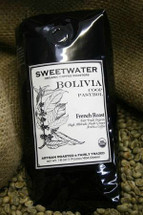Organization |
Geographic Region |
| Founded in 1988 Comprised of 85 members |
Calama, Caranavi |
Certifications |
Altitude |
| Organic; FLO; SPP | 1350 – 1700 meters above sea level |
Varietals |
Quality Profile |
| Arabica – Typica, Caturra | Medium acidity, full body, cocao, sweet almond and ripe berry flavors |
The Mejillones cooperative was founded May 8, 1988 when the original 20 farmer members came together to promote organic practices and quality coffee production in the region. Today with 85 members, Mejillones is well positioned to sell into national and international fair trade and organic markets – now with an average annual production level of some 3,750,000 pounds of exportable, green coffee.
Quality improvement and control has been a cornerstone in Mejillones development. Mejillones Commercial Manager Marcial Huanca is certified as a Q-grader and has judged at Cup of Excellence and Cup of Fair Trade competitions previously held in Bolivia. He has actively promoted internal competitions at Mejillones in order to promote best practices and internal learning amongst members.
Their efforts have paid off. With dark fruit, fig and dark chocolate flavors, sweet and pleasant acidity and a thick, creamy body, the Mejillones’ classic cup profile tends to be a top finisher in national competitions
Given that the Caranavi region underwent a relatively recent land reform – farmers here have relatively large plots. On average, Mejillones producers own 4-8 hectares of land, with much of that dedicated to coffee. Wet processing is done individually on site. And once the coffee parchment has been fully sun-dried on patios, the producers will bring their sacks to the Mejillones central warehouse in Calama. When a container load is ready for processing, a truck is dispatched to transport the parchment coffee to the Mejillones dry processing plant in El Alto, La Paz.
Nearly 90 percent of Fair Trade premiums earned at Mejillones have been invested in the purchase and maintenance of this plant in El Alto, further enhancing both their organizational autonomy and their quality control. Now with proven quality, and with Fair Trade and Small-Farmer Symbol certifications, Mejillones is well positioned to sell into specialty and fair trade markets alike.
The remaining 10 percent of Fair Trade premiums goes towards the purchase of organic components and for education and training going towards Mejillones members’ composting and soil management regimes.
Our partnership with Mejillones began only a few short years ago. But we are encouraged and enthusiastically looking forward to a long and mutually beneficial relationship into the future!

